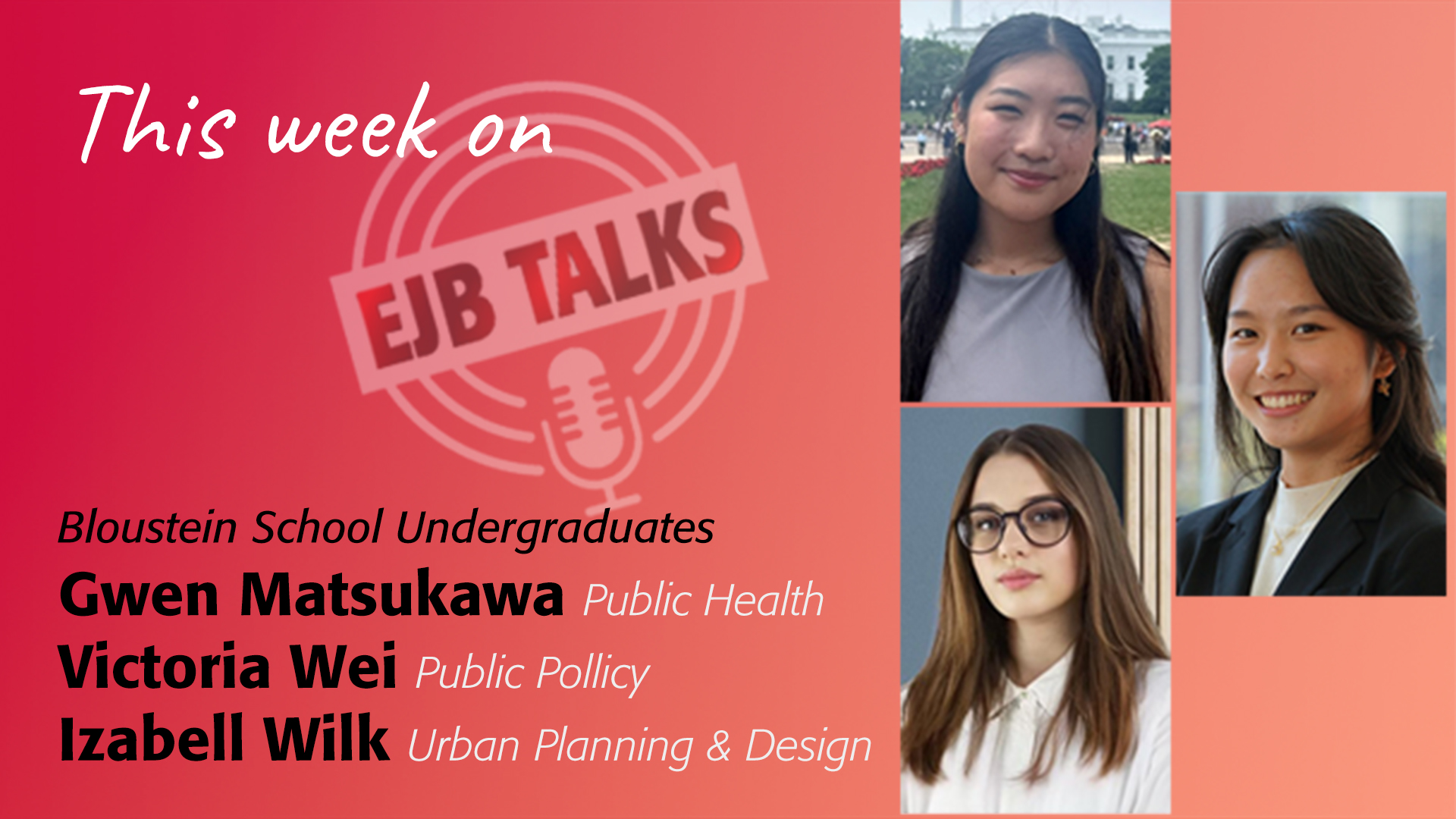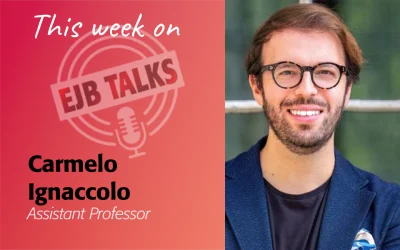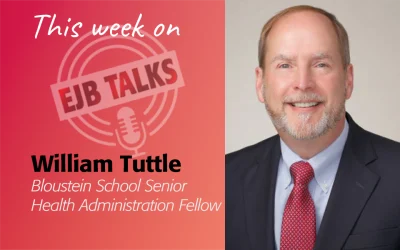Transcript:
Stuart Shapiro
Welcome to EJB Talks. I’m Stuart Shapiro, the dean of the Bloustein School. And the purpose of this podcast is to highlight the work my colleagues and our alumni in the fields of policy, planning and health are doing to make the world a better place.
Today, we’re not talking to alums or faculty, but rather to three of our undergraduate students. All three participated in a Rutgers program called the Washington DC Rutgers Summer Service Initiative, or DC RSSI. This program allows students to take summer internships in Washington DC, and with the financial support of Rutgers and some generous donors, pays for their housing and other expenses. The three students I’ll be speaking with names are Gwendolyn Matsukawa or Gwen, Victoria Wei, and Izabell Wilk. Welcome to the podcast.
Victoria Wei
Thank you for having us.
Gwen Matsukawa
Thank you.
Izabell Wilk
Great to be here.
Stuart Shapiro
Let me start — and all of my questions are gonna be pretty basic, because we want to get all of you in but — let me start by asking you to introduce yourselves by mentioning what you’re majoring in and say a few words about why you wanted to do DC RSSI. And Gwen, we’ll start with you.
Gwen Matsukawa
Okay! My name is Gwen Matsukawa. I am a senior majoring in Public Health and I’m minoring in Medical Ethics and Health Policy and Planning and Public Policy. From all of my schoolwork, I knew that I wanted to learn more about health policy from a government or non–or an NGO office. So I felt like when I saw the email in my inbox from Rutgers, about the RSS DC initiative, I was really excited to apply for it and see how Rutgers could help me out. And they did help me out a lot with this experience. But also to learn more about government and the legislative process. So it was a really interesting opportunity.
Stuart Shapiro
Great! Victoria?
Victoria Wei
Hi, my name is Victoria. I’m a junior at Bloustein studying public policy. And I’m also over at SEBS studying environmental planning. So, again, I wanted–kind of like Gwen — I have learned about policy in my classes before. And I was really interested in doing a public service internship for the summer. I’d worked at an environmental nonprofit in the past, so I wanted to kind of extend that experience. And also, when I saw the RSS DC opportunity, it just seemed too good to be true. So, you know, having free housing and a stipend in DC. It just seemed like an amazing opportunity. So I jumped at the chance.
Stuart Shapiro
Wonderful. Is it environmental policy that you’re interested in?
Victoria Wei
Yes, for sure.
Stuart Shapiro
I’m a public policy person as well. And I spent some time doing environmental policy. Before I took on all this administrative work. (laughing). Izabell?
Izabell Wilk
Hi, my name is Izabell. I’m a senior majoring in urban planning and design. And I think my interest in the program stemmed from personally searching for an internship and also the fact that I was a commuter. So, being able to experience something like this living with Rutgers students, and especially in a city like DC as Victoria mentioned, I thought it was very attractive.
Stuart Shapiro
So there were about 25 of you. Did you all live in a dorm together? How did that work?
Gwen Matsukawa
There was an apartment building that we all lived in together. So we all had roommates. And then we were all pretty much on between two floors. So we saw each other often and had a class on the first level of the building too, every Friday.
Stuart Shapiro
Right, right. Rutgers ran a class as part of that taught by Elizabeth Maddow, Professor Maddow. I gotta tell you, man living in Washington, DC, over the summer and being a young person, it just doesn’t get much better than that. Except for the weather, of course,
Gwen Matsukawa
It was very hot.
Stuart Shapiro
It was very hot and humid. The days I walked to work in my suit in and it was already 85 and humid out. Pleasant memories of that. (laughing).
So I have to tell everyone, it’s not it is a coincidence. But it’s a wonderful coincidence that we have three different majors here — a public policy, major public health major, and an urban planning major. It gives you an idea of sort of the diversity of disciplines and experiences that we have at the Bloustein School. And I’m sure that’s going to play into the answer to my next question for each of you, which is, where did you do your internship and what type of work did you do there? And Gwen, we’ll start again with you.
Gwen Matsukawa
Sure. Okay, so I was very fortunate, I feel like, in that I was able to work as a legislative intern for Congresswoman Bonnie Watson Coleman. During that internship, I worked on a lot of different things. I would batch emails and take phone calls from constituents. So I was directly involved with talking to a lot of different people.
But I would also be able to help the legislative aides and staffers with different projects. So I was able to work on online research for different policy issues. And also go to congressional briefings and hearings to write up different memos about different issues that I thought were pretty interesting, because while I was lucky that they would also be very attentive to the fact that I was interested in health policy, so I did get to work on a lot of that. I was also able to work on a lot of different issues that I wasn’t necessarily familiar with. So it was definitely a new kind of territory for me.
But I think that’s also why I gained so much from the experience, because I learned so much more information. I was so much more, with the current events that were happening today, and understanding how different topics overlapped with one another because I felt like a lot of it did overlap with health policy anyway. So I think that was very important for me specifically, because I got to branch out a little bit more and learn about how everything does, at the end of the day, in my head at least (laughing) come back to health policy! So, yeah.
Stuart Shapiro
And I bet when you see the news about everything that’s going on in Congress, particularly since you’ve gotten back to Rutgers this fall, with the speaker battles, budget battles, you read that as a much more informed consumer than you did before your summer.
Gwen Matsukawa
Yes, definitely. (laughing)
Stuart Shapiro
I don’t know if you’d be any less cynical, but you’ll be more informed! (laughing)
Gwen Matsukawa
Right, right! (laughing)
Stuart Shapiro
Victoria, what about you?
Victoria Wei
So I ended up interning at the Sustainable Forestry Initiative. They’re an environmental nonprofit that operates all across North America. I was working in their communications department, and specifically doing a lot of work with their indigenous relations team.
So they have been doing a lot of communications with indigenous people in Canada, but a little bit less than the U.S. So they had me researching a lot of things for that, specific to the U.S. In addition to that, I had a lot of flexibility in my role. So I got to explore some of my interests in policy. And so a project that I worked on was, kind of researching how the SFI standards–because they do like third-party certification–so I researched how their standards line up with different forest action plans from states. So trying to bring that nonprofit side and align it with the public policy.
Stuart Shapiro
Had you had any experience in forestry or forest issues before you did this?
Victoria Wei
No, not specifically. (laughing) It was a lot of learning on the job.
Stuart Shapiro
And that’s, you know, I mean, that’s a lot of what both internships and first jobs are. I mean, it’s, you know, they’re looking for people with skills and diligence and the kind of characteristics they want, and interest in the area and a willingness to learn. But you don’t have to be a forest expert to go do an internship at the Sustainable Forestry Initiative.
Victoria Wei
Right.
Stuart Shapiro
Izabell, what did you do?
Izabell Wilk
Sure. I interned with the DC Public Education Fund. And they are essentially the philanthropic arm of the DC public school systems. Mostly their day-to-day work looks like writing grants and just managing the distribution of those grants.
I was the communications and strategy intern. So I mostly helped with like their newsletter and getting them more visible on their socials. But I think one of the most notable, like additions that I brought through my internship was presenting them with this new grant management database called Instrumental, where they were able to, like, centralize all of the work that they were doing and prospect new grants, so I’m very proud of that.
Stuart Shapiro
That’s excellent, excellent. Not the kind of typical work an urban planner might do over the summer.
Izabell Wilk
No, not really, but it was a great experience overall.
Stuart Shapiro
Fantastic. Okay, for the last question that I’d like to ask the three of you. And some…. you’ve alluded to some of this, but let’s let’s tease it out a little more. Talk a little bit about what you feel you got out of your time in Washington. And what are your future plans and if they were affected at all by your summer experience? And so Gwen you’re our leadoff hitter, you’ll go again.
Gwen Matsukawa
So like I said before, I feel like I did get a lot out of this experience overall, just the RSS DC program in general. But from the internship specifically, I feel like because I was surrounded by mostly, like — my fellow interns were mostly all political science majors or related to public policy — there was definitely a sense of, I don’t want to say urgency, but a little bit of urgency for me to be a little bit more on my game with figuring out how everything works on my own time in the background. So that was definitely an experience for me.
But I feel like I did learn a lot more about the legislative process. And then with the RSS DC experience, in general, taking the class that we took. That was the first political science class that I ever took really. Or, related to political science, I should say. So that was really interesting for me. But I think because in the future, I am very interested in working on analyzing or legislative research in general regarding health equity, it was really interesting to see exactly how polarized our Congress is right now. Because I do think that that plays a significant role in a lot of the different policies that I’m interested in at least, and how that might play out in the future.
So learning about political feasibility was also definitely new for me. But I would say, otherwise, it was just a good experience. I’m hoping to go to grad school and get my master’s in public health. So that should be fun. But I’m excited otherwise,
Stuart Shapiro
You’re going to go right after school? Or are you going to take some time off and work first?
Gwen Matsukawa
I’m hoping to go right after school. But I understand that that isn’t always the option that everyone does take. So I am open to also going to work as well.
Stuart Shapiro
Right, right. Well, your ability to sort of straddle the worlds of public health and how legislation works, both at the state and the federal level, I think will serve you well, in a in a health policy-oriented career there. So that’s, that’s great. Victoria, what about you?
Victoria Wei
Yeah, so I think the Sustainable Forestry Initiative was a different kind of nonprofit than I had worked with in the past. And it was less focused on government relations. It was less focused on advocacy and lobbying and more focused on working with private entities and administering grants. So as a public policy student, I kind of got a different perspective on how change can be made and how like, certain standards can be enforced, not necessarily through government regulation.
So it was a really interesting experience just to learn about that side of public service. And I think it was really valuable for me to see all the different ways that people can be served. But, you know, as you mentioned, the other part that I learned was just about forestry, in general. And they actually launched a new standard while I was there for urban forestry. And that was really, really interesting to me because I do want to go to grad school for urban planning. So it was a nice, it was a, it was a great coincidence for me, just to see that intersection of forestry, which I was less familiar with and, you know, urban planning, which I have an interest in.
Stuart Shapiro
That’s great. Yeah, so you are a junior, you’re going to try and do another internship this summer, or what are your thoughts about that?
Victoria Wei
Yeah, I’m definitely looking for opportunities right now. I will be interning at the New Jersey State Senate in the spring. So we’ll see how that develops. But yeah, always trying to gain different experiences and slightly different fields. But all coming back to public service.
Stuart Shapiro
Are you allowed to do RSSI twice?
Victoria Wei
Not RSS DC. So we can’t reapply for it.
Stuart Shapiro
I see. Okay, so that’s that’s foreclosed. Gotcha. All right, Izabell. How about you?
Izabell Wilk
Well, I feel like what I got out of my internship was, seeing how a small team at the DC Ed Fund was able to manage all of these grant programs that really, really shape the next generation of students in a huge city like DC. And I think that getting to know the team that worked there was really, really important as well as also, getting to know all the students in the cohort. And I think, as for my future plans, I also intend to go to grad school. But I think I’m going to take at least a year to work before I go.
Stuart Shapiro
Do you think you want to stick with urban planning as your graduate school future? Are you looking at other fields as well?
Izabell Wilk
Currently, yes, I am looking at urban planning. I’ve also considered law. But I do want to work and see if I can get a little bit more clear on that.
Stuart Shapiro
As dean, I’m contractually obligated to tell Victoria and Izabell that the Bloustein School does have the third-ranked Urban Planning program in the country. And if you do want to stay at Rutgers, we’d love to have you here.
Izabell Wilk
Very aware of that.
Stuart Shapiro
I’m sure you are. We’re not bashful about it. Thank you all very much for taking the time to share your experiences. DC-RSSI is a great Rutgers initiative, that President Holloway initiated, and we’ll be going into its second year this year.
And if there are any undergraduates out there listening who are thinking about what to do this summer, Rutgers undergraduates please consider the DC-RSSI experience. I think, as you heard from these three students, it really was a good experience for them. So thanks again for coming on.
Gwen Matsukawa
Thank you for having us.
Izabell Wilk
Thanks so much!
Stuart Shapiro
Thank you as well to our producer Tamara Swedberg and Karyn Olsen, who helps out with production. We’ll see you all next week with our season-ending episode another talk from another expert at the Bloustein School. Until then, stay safe.




